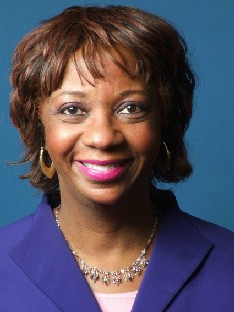Kamala Harris speaks at NARAL Pro-Choice America
A little over a month ago, Republican House speaker John Boehner, took control over the most anti-pro-choice Congress that we have seen in decades. The 2010 elections focused on economic anxiety. Instead of the Republican Congress being focused on a jobs agenda, they have instead focused on an extreme anti-choice agenda. They have gone from trying to re-define rape to allowing hospitals to refuse abortion care to women who will die without it. So the Republican candidates who campaigned on jobs and keeping government smaller are failing to live up to their promise.
In this anti pro-choice climate, NARAL Pro-Choice America held a luncheon on February 10, 2011, marking the 38th anniversary of Roe v. Wade. The themes were protecting the future of reproductive rights for the next generation and building on consensus coalitions to achieve it. The program included actress Felicity Huffman of ABC's Desperate Housewives, as the mistress of ceremonies and California Attorney General Kamala Harris as the keynote speaker. Instead of Republicans dampening the resolve of NARAL Pro-Choice America, it has deepened their resolve to protect reproductive freedoms. President Nancy Keenan remarked that the strongest steel is made in the hottest fire. She told the crowd that "we are putting out fires every day and we are stronger for it." One of the greatest strengths lies in the Millennials, those born after 1980, according to Keenan. Millennials are more pro-choice than the country as a whole. And by 2020, Millennials will make up 40% of the eligible voters in the country. Nancy Keenan reminds us that America does not have a mandate to attack a woman's rights. NARAL has played a pivotal role as a leader of the pro-choice movement for over 40 years.
California Attorney General Kamala Harris, a rising star in the west came to the east to give the keynote speech. Harris made history this fall as the first woman, first African American and first Indian American to win and serve as California's top lawyer. Harris recognized that there can be no freedom for women without reproductive freedom. Harris comes from a family history of fighters for reproductive rights. She spoke about her Indian grandmother who walked the streets of India with a bull horn, to advocate for reproductive rights. Harris, as a veteran prosecutor, may appear as an unlikely strong advocate for pro-choice. Yet, she says it is because of her prosecutorial background that speaks to the contrary. And as a 20 year prosecutor, she understands that being a prosecutor is about being a voice for the most vulnerable. She spoke about women and particularly, girls and young women need control over their lives to break the cycle of crime. It is for this reason that she forcefully fought against any restrictions on the right of abortion. She fought back California's ballot measures requiring parent notification for minors and a waiting period of 48 hours. However, 43 states now, require parental notification. California, the nation's largest state of women and particularly young women, must have safe access to reproductive service, she argues.
Kamala Harris, a strong believer in building consensus urged pro-choice advocates and groups to build consensus in unlikely places. She stressed that natural allies lie with the LGBT community, civil rights groups, disability groups and others. In speaking to LGBT groups, she asks how they would feel if they were asked at age 16 to seek consent from their parents before making a decision involving their sexuality. And then it hits home to them about the importance of the choice rights facing women.
A woman's right to choose is a basic human right. And it is under attack by politicians who want to make government smaller by making government "just small enough to fit inside our bedrooms and our medicine cabinets" says NARAL President Keenan. The disrespect for women continues in many states. Cuts for family planning programs are underway in Wisconsin. A bill is pending in South Dakota to force a woman to visit an anti-choice "crisis pregnancy center" before access to abortion care.
Reproductive freedom is a part of the promise of freedom of our forefathers of 1776. There is no freedom for women without reproductive freedom. The struggle for women's rights and the right to choose is about the struggle for human justice. And the fight continues.





